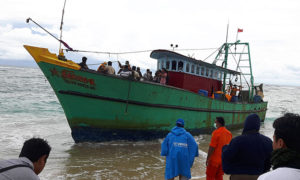Indonesian law sets out rights and responsibilities for asylum seekers
Indonesia has softened its stance on asylum seekers by streamlining procedures for processing migrants and clearing barriers that had previously stopped them from entering the country.
President Joko “Jokowi” Widodo has issued presidential regulation detailing protocols on how to handle people who arrive in Indonesia fleeing life-threatening events in their homelands.
 The protocols, signed on December 31, will help the government assist the more than 14,000 refugees and asylum seekers who have been largely ignored since entering Indonesia.
The protocols, signed on December 31, will help the government assist the more than 14,000 refugees and asylum seekers who have been largely ignored since entering Indonesia.
A government spokesman said the regulation was introduced in response to the need for a legal basis for handling refugees because Indonesia is a non-signatory of the United Nations’ 1951 Convention Relating to the Status of Refugees.
Previous laws gave no advice to government agencies on how to handle refugees and asylum seekers stranded in Indonesia on their way to other destination countries, such as Australia.
Last year, Indonesia was criticised for its treatment of a group of Tamil migrants from Sri Lanka who were stranded on a beach in Lhoknga, Aceh, in northern Sumatra.
The provincial government there refused to allow them to disembark for a week, confining them to their grounded and cramped boat.
The local government claimed the asylum seekers lacked the proper documentation and that it had no budget to look after them. It said it had previously faced problems hosting hundreds of Rohingya Muslim asylum seekers.
The Jakarta government eventually ordered the Aceh administration to allow them to disembark.
The new protocols contain detailed instruction on which institutions are responsible for managing refugees in Indonesia, complete with each of their respective responsibilities.
It also serves as a legal basis for regional administrations to propose operational funds for handling asylum seekers and refugees and providing temporary shelters.
“With the presence of the presidential regulations it is now clear who is doing what and what kind of responsibility each institution has,” the government spokesman said.
According to the protocols, assisting refugees will be done through cooperation between the central government and the UN High Commissioner for Refugees (UNHCR) and other international organisations.
They also say that the Office of the Coordinating Political, Legal and Security Affairs Minister will coordinate the handling of asylum seekers in the country, from their discovery to settling and monitoring them.
For the discovery of asylum seekers, the National Search and Rescue Agency (Basarnas) is tasked with conducting search and rescue operations on vessels suspected to be transporting asylum seekers.
Once the asylum seekers are found, they will be moved to safety boats if the vessels are about to sink and taken to docks or nearby land.
Asylum seekers in need of medical attention should be taken to immigration detention centers or local immigration offices or nearby police stations to received aid, the protocols say.
They say the United Nations High Commissioner for Refugees UNHCR will review proposals from asylum seekers and decide whether they are eligible to be granted refugee status.
If their applications are rejected, the relevant institutions would have the authority to deport them to their countries of origin.
The UNHCR’s senior protection officer in Indonesia said the organisation would support whatever policy is taken by the Indonesian government on refugees so long as it respects human rights and does not force refugees to return to their home countries.
Laurie Nowell
AMES Australia Senior Journalist












